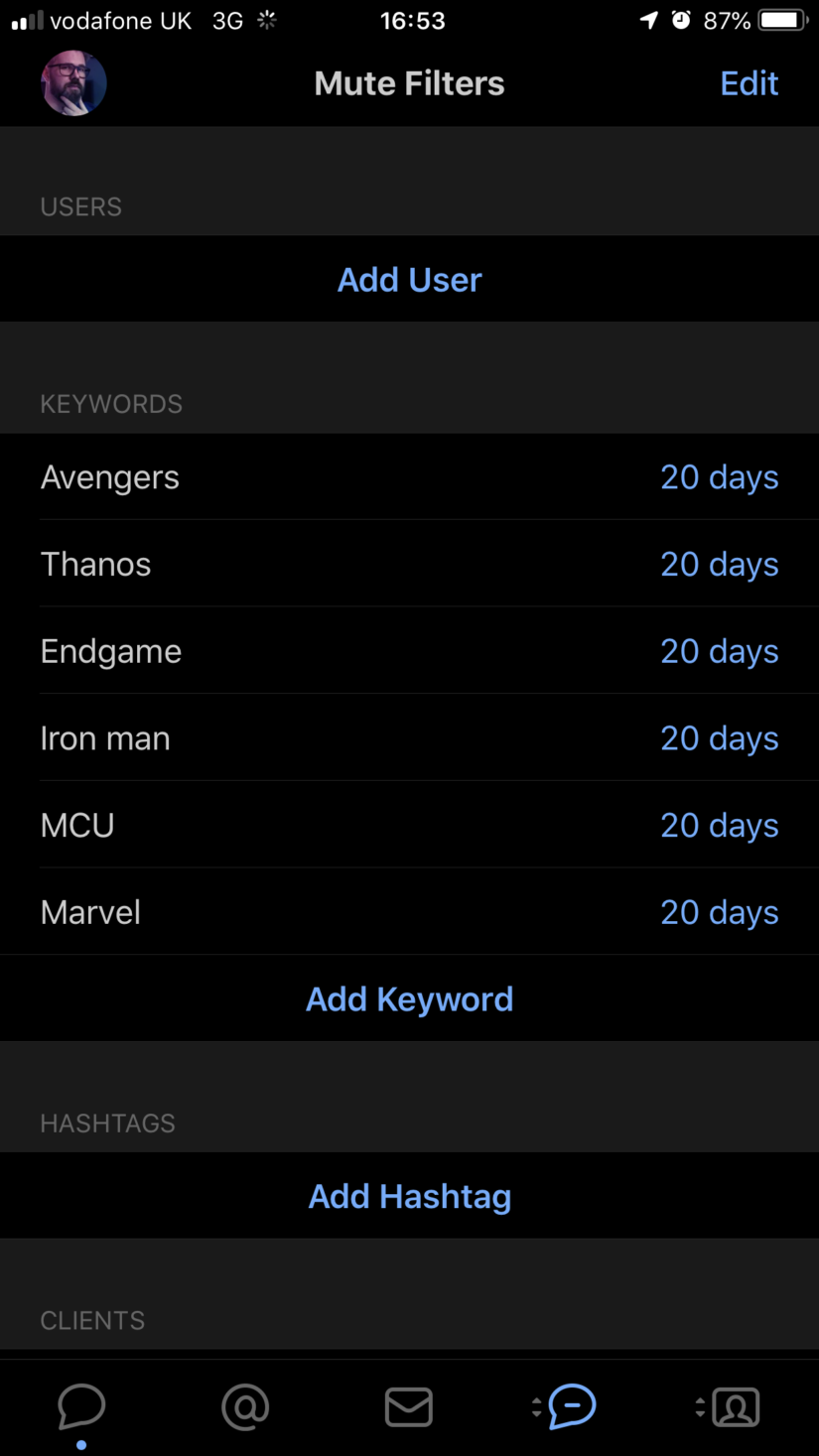I don’t care if your car is tiny and “Smart” – if you park like this (blocking the pavement) you’re an asshole ?
“Artisanal versions of Twitter and Facebook hope to keep the good while jettisoning the bad.”
I don’t know exactly when it was added, but WordPress.com finally has a way to export your media uploads! When I moved off of WordPress.com, a couple of years ago, the only way to “get” your media was to export your posts, and your new site would download the files as the posts that used them were imported. This was obviously very error-prone, wouldn’t work for media not used in posts, and spectacularly failed to work for me — leaving a great deal of my uploaded media stranded on the WordPress servers. With this new export option I’ve just downloaded 1.5GB of media from two sites I had hosted on the service, so I might finally be able to reconstruct several old posts. Happy days!
I think I’m going to have to revise my ambitions around finishing 3 Knights this (long) weekend… All of that trim takes a deceptively long time to do! I’ll hopefully get 1 finished off though.
Reposting: a tweet
“Well, with the launch of a new charity army being mooted by @vidpui and @nerodine , I thought this might be a really good time to go through everything I learned by doing the Salamanders Charity Raffle back in 2015. I’ve mentioned some of this on Twitter recently, but going through it step by s…”
“I attended a seminar on the science behind the new Contrast Paints and between that and what I saw (and experienced) today, I’d like to share as much of it with you as possible. At the moment information is a little light on the ground (though that is sure to change in the coming weeks leading up to their release), so I hope this can be your one-stop shop for getting up to speed on Citadel’s new paint system.”
I can’t wait to try these paints. I have acquired a large backlog of miniatures I don’t care enough about to paint with the long-winded “traditional” method, so having something I can use to churn out entire units in a few hours will help me get them out of the cupboard and usable in games.
These will share a similar fate. I was just slightly perturbed that they’re directly targetting me. My partner hasn’t had any mailed to her, and apparently many of her friends are the same – their (male) partners have received the same leaflets as me, but they haven’t. Lucky them!
Someone suggested this to me offline, and I’ve definitely been thinking about it… it’s just the right level of petty ?
““@MstrKapowski Send them GDPR requests…about where they got your data from, watch them scramble to not get the info to you in time and thenreport them so they get fined! It’s what I’m doing! #theEUstrikesback””
I’ve taken the decision to switch my site away from the custom theme called “K” I was building, and for now I’m using the excellent Autonomie by Matthias Pfefferle instead1. Development of K had already slowed to a standstill, and realistically, I’m not going to go back to it anytime soon. It feels a little like a failure, a little like giving up, but I think it’s ultimately the right thing to do.
I made a lot of mistakes while building K, which overcomplicated things, made development more difficult, and ultimately led me into a dead-end. I thought “for simplicity” that I would use the Bootstrap frontend framework, as it would give me a robust foundation to build on. It did, but I had to bend and twist WordPress in increasingly hacky ways to get the output to “play nice.” A large chunk of the K codebase was being taken up by code solely tasked with massaging the output of WordPress to add the right Bootstrap classes or container markup. It felt increasingly fragile and hacky, and it was a bad sign. K would work for my setup, but I couldn’t ensure it would work for everyone.
Bootstrap added other complications: to properly manage my CSS “overrides” I had to create a build system that would compile a whole lot of SASS files together. When I started K, the CSS was stripped down to the bare minimum needed, and came to a few KB. After a while I ended up including the whole Bootstrap framework, just to make the build process easier.
There were no “options” to speak of, so it couldn’t be tailored to suit someone else using the WordPress customiser. I didn’t even want to think about Gutenberg support.
Microformats always felt like whack-a-mole. I’d get them working, then make adjustments somewhere else, and promptly see things break again. I put this on my need to make so many adjustments to the WordPress output – inadvertant issues kept creeping in.
Then there were the visual design choices. K grew out of the simple design I employed when I was writing 1-2 short posts a month, in the traditional format. In that scenario it worked fine. Once I started to use the various post kinds, things became more problematic. Now I was posting several posts per day, most of which weren’t in a traditional blog format. The home page became cluttered; it started to remind me of a badly thought-out notification area, rather than a well designed blog. The archive page was a disaster and I had no good ideas on how to fix it. There were a thousand other little niggles.
None of this is meant as a knock against Bootstrap, or WordPress, or build systems, or any other tool or technology I used to get to this point. K failed because of my decisions, rather than deficiencies in the tools. There were things I liked about K… it used zero JavaScript, and I did my best to stop unnecessary plugin resources from loading. Markup was as minimal as I could make it (within the constraints of what I could remove from WordPress output, microformats, and what Bootstrap needed). It worked well across browsers and devices (thanks Bootstrap!), and the accent colours were fun. I learned a lot about the excellent Post Kinds plugin during the development process. I’m filing it away as a failed experiment, which I’ll learn from and apply the lessons to the IndieWeb WordPress theme I’m still intending to create. One that will hopefully work for more people than just me ?
I put the source code to K on GitHub right back near the start of the project. If you want to take a look, steal any code, rework it into something usable – feel more than welcome to!
1 As a result, a couple of things that were setup specifically for K are broken. I’ll look into fixing those over the next few days. ⤴️
“”Soph” has nearly a million followers on the giant video platform. The site’s executives only have themselves to blame.”
?♂
“Design decisions across our projects can mean the difference between affirmation and invalidation—and sometimes safety and danger. Erin White explores the repercussions for trans, non-binary, and gender-variant users and what we can do about it.”
“A Washington family’s nightmare year.”
I’d be lying if I said I don’t constantly worry about my own son falling down the troll tunnel.
I’ve just discovered a fringe benefit of my currently bushy, slightly unkempt, beard – it can redirect a minor coffee spill, saving my white shirt from a stain ?
“The new Windows Subsystem for Linux will use a real Linux kernel.”
Who’d have thought they’d be seeing this, even 5 years ago?
My Game of Thrones mild take – the show just hasn’t been the same (or as good) since they went “off book,” and tried to squeeze more and more plot into fewer episodes. It’s been so uneven, and at times nonsensical over the last few seasons it’s like a different show.
“To me, these are the two ways of avoiding the takeover:
- Innovate on features and discoverability
- Find ways to help podcast producers know more about their listeners
Marco Arment took a nice step on point 1 with his clip feature that he added to the Overcast podcast app. Other innovations might be to support more distributed directories to assist in podcast discovery (OPML inclusion, anyone?).
Progress on point 2 might be difficult (requiring collaboration, between podcast app makers and other groups of people), but it might be better to band together to create new standards/processes/protocols than to be “picked off” one by one.”
I’m not sure I agree with item 2… I don’t really want podcast producers to know anything about me, and wonder why they need to know anything about me. I’m going to guess it’s mainly to sell ads? If there’s another reason you’re thinking of, please do let me know!
It would – to me – feel like the slippery slope to the same sort of “data collection/analytics” that led to the tracking and profiling nightmare we are seeing push back against on the web. Effectively swapping one concern (walled gardens) for another (privacy).
I have no problem with podcasters earning revenue, but I do wonder if audience targetting is the way to go. Podcasts have survived and grown thus far with the current model – otherwise we wouldn’t be seeing these predatory encroachments.
But perhaps I’m not thinking about the problem openly enough, and with the lessons of the last few years, something could be built? ?
“Blackmailers wiping GitHub repositories and withholding code to extort Bitcoin from their victims haven’t made enough to even buy a coffee.”
“Political leaders believe that the views they encounter online are representative of the “general public.” They’re not.”
“Mean world syndrome is a term coined by George Gerbner to describe a phenomenon whereby violence-related content of mass media makes viewers believe that the world is more dangerous than it actually is. Mean world syndrome is one of the main conclusions of cultivation theory. Gerbner, a pioneer researcher on the effects of television on society, argued that people who watch television tended to think of the world as an intimidating and unforgiving place. A direct correlation between the amount of television one watches and the amount of fear one harbors about the world has been proven, although the direction of causality remains debatable in that persons fearful of the world may be more likely to retreat from it and in turn spend more time with indoor, solitary activities such as television watching.”
“An Amazon-owned firm is hiring editors to push local crime news to its users.”
“A key concept I’ve embraced for the new, breakneck release pace of GW games is “Not everything has to be for you.” Warhammer Underworlds? Not my bag. Wrath and Rapture? Not my armies. Necromunda? Realistically, my local scene can’t sustain the type of campaign Necromunda really needs.”


